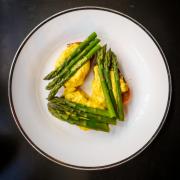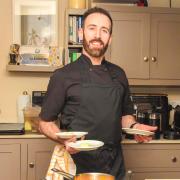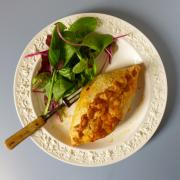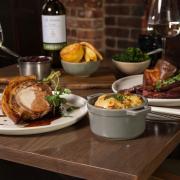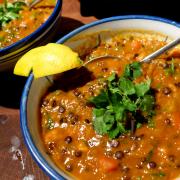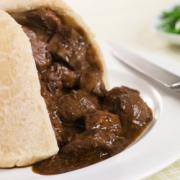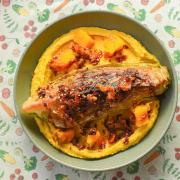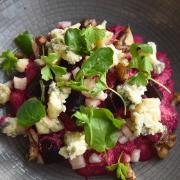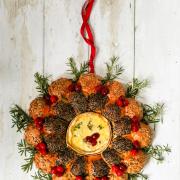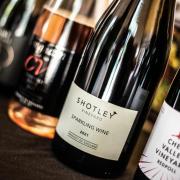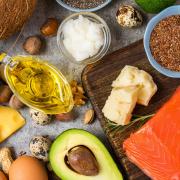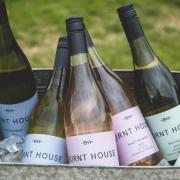Linda Duffin meets Andrew Deacon, second-career farmer at Earl Stonham and the UK’s only commercial producer of full-blood Wagyu beef

“We have terrible beef in this country and I don’t mind you quoting me saying that,” says Andrew Deacon, of Earl Stonham Farms. That’s fighting talk in a nation so famous for its love of a roast rump that the French used to call us ‘les rosbifs’, but Andrew is unrepentant.
“It’s not the farmers’ fault. There are no incentives in the market place for them to produce tasty beef. Why do we have such bad beef? Because it’s fed on anything they can get that produces an animal that they can actually make a bit of profit on by selling it for £1,200. Well, that’s a jolly tall order. About 80% of all the carrots produced in this country go to cattle feed. What sort of taste are you going to get in beef if you feed them on carrots? But no supermarket is prepared to pay extra for them to be fed in the way that is likely to produce tasty beef.”
A retired businessman, Andrew had always wanted to farm, so he bought up land around his home in Earl Stonham and set to work.
“I wanted to farm beef because I wanted to produce a better quality beef. I wasn’t interested in smart breeds or becoming a pedigree breeder. I didn’t care what they looked like, I wanted to produce fabulous beef.”

Believing the United States produced a better steak, he travelled to California and asked cattlemen his billion dollar question: Does the answer lie in breeding or feeding? His breakthrough moment came at a feed lot near the Mexican border which had a secret feeding formula. “I thought their beef was amazing,” says Andrew.
Back home he began experimenting on dairy crosses with a modified version of the formula and achieved what he thought was a better quality meat, but says: “I felt that more marbling was required to produce the perfect steak.” He bought a herd of Wagyu cattle from a farm in Wales and nearly eight years later is the only commercial sized producer of full-blood Wagyu beef in Britain.
Wagyu (pronounced wag-oo) cattle originate in Kobe in Japan and are famous for their tender, fat-marbled meat, although Andrew says it is a myth that they’re fed on beer and given daily massages. Andrew’s Wagyu spend their first two years like any beef cattle, out to grass in the summer and in barns in the winter. But for their final nine months they go into the bovine equivalent of a five-star hotel, where they are fattened on the special feed formula. They are not slaughtered until they are three years old. It all makes for very expensive beef, to raise and to buy.
“It’s b****y expensive!,” says Andrew. “Most beef animals are killed when they’re 15 months old. If you’re having to take them on for three years your whole herd has to be nearly three times the size. The feed itself for nine months costs almost as much as a normal farmer will get for a normal animal. And you do get more mortality among this breed, which comes from a very small gene pool. It’s not a strong breed.”

Because Andrew has to produce calves all year round to feed the demand from restaurateurs, he has a special maternity unit to avoid the problem of vulnerable barn-bred calves picking up disease. It all adds to the expense and Andrew is reluctant to say whether he has yet broken even. “Let me just say that this is a commercial project which will do very well,” he says cagily. He expects the herd to top out at 450 head next year under the care of farm manager Neil Ridgway.
“I’m not interested in endlessly increasing the size of my farm and my marketplace. I’m interested in having a sufficiently large undertaking for the project to be profitable and to produce the finest beef. That’s what I want Earl Stonham Farms to be known for,” he says.
So does it live up to expectations? That is a hard question to answer as Andrew’s Wagyu is only available to restaurateurs via catering butchers Aubrey Allen and to retail customers from the posh people’s butcher Lidgates in Holland Park in London.
Danny Lidgate, who sells Andrew’s steak for an eye-watering £180 a kilo and Wagyu burgers for £3.50 apiece, describes it as “magical”.
“His Wagyu is almost a different species to a grass-fed animal. It has a richness, it has a lot of marbling, it has a sweetness. But the tenderness is the big thing. It’s ultra, ultra tender.” It is popular with top chefs. Raymond Blanc at Le Manoir aux Quat’Saisons and Heston Blumenthal are both fans. Closer to home, it is on the menu almost every week at Galton Blackiston’s Morston Hall in Norfolk.
Even there, the Michelin-starred chef says: “We can only afford the feather blade because it comes at an extortionate price. But it’s beautiful marbled beef. Feather steaks are only as good as the quality of the beef and with this, you can rely on it. It’s got a beefy, fatty, unctuous flavour and it’s very versatile.
“It’s very, very popular with our customers and everyone is interested in whether Wagyu is as good as it’s made out to be – and it is.”
Andrew Deacon admits that the classier cuts of his beef are only for people with deep pockets.
“Hedge fund managers!” he jokes. “The meat, by the time it reaches the consumer, especially in restaurants, is very expensive. I get a lot of enquiries, people often ask me where they can get it in East Anglia and I think some people are quite cross that it’s not on sale here. But there isn’t a butcher in East Anglia who regularly has customers who are prepared to pay upwards of £150 a kilo for their steak.”
The good news, for those of us who don’t work in the financial sector, is that a Suffolk pub has just put Wagyu burgers on the menu. Chris Bruce used to run the Shepherd and Dog in Forward Green and says people would drive for miles to sample the burgers there. Now he is head chef at the newly-refurbished Crown in Stowupland and says he expects them to become best-sellers there too.
“Andrew’s Wagyu is an extremely good product. When it’s cooked it’s very creamy because of the fat in the meat. All we add is six grammes of salt to a kilo of mince – nothing else goes into the burgers.”
The Crown is selling them, with all the trimmings, for £16. It is £6 more than their regular burger – but a heck of a lot cheaper than paying up to £35 for a single steak and cooking your own. Some supermarkets are selling Wagyu burgers too, but Andrew Deacon would say ‘beware of imitations’. He reckons the supermarket burgers are made from cross-bred, not pure-bred, meat.
“Everyone’s trying to capitalise on the Wagyu brand. When supermarkets get hold of a source of cheap Wagyu, there’s usually a reason that it’s cheap. There’s no marbling in it at all.” As the old saying goes, you pays your money and you takes your choice.




